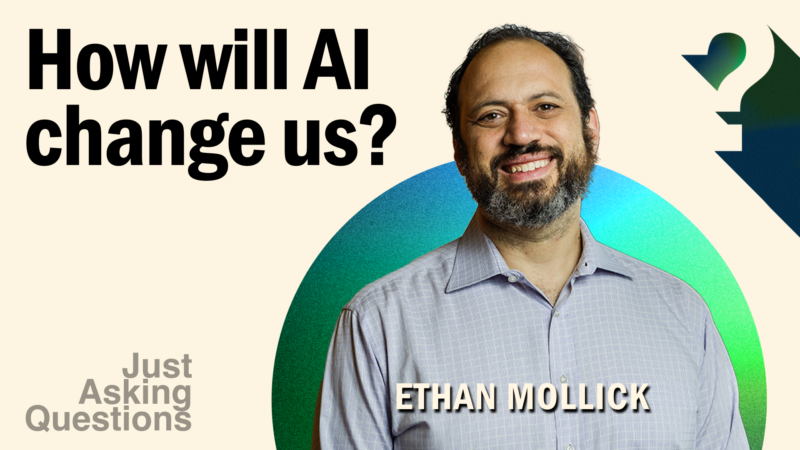Player FM 앱으로 오프라인으로 전환하세요!
Ethan Mollick: How Will AI Change Us?
Manage episode 410664244 series 3535713

"I discovered something remarkably similar to an alien co-intelligence," wrote Ethan Mollick in his new book Co-Intelligence: Living and Working with AI, describing the "sleepless nights" he experienced upon first encountering ChatGPT 3.5 in November 2022.
Mollick, a professor at the Wharton School of the University of Pennsylvania and author of the One Useful Thing Substack, has studied, taught, and written about the effects of artificial intelligence on work and education for years. He joined Reason's Zach Weissmueller and Liz Wolfe on the latest episode of Just Asking Questions to discuss the ways in which large language models like ChatGPT and Google Gemini are already transforming the workplace, the classroom, artistic production, and the truth-seeking process itself.
In this episode, they discuss why you should treat your chatbot like a person even though it's not, how AI is "decomposing" jobs, what tools like OpenAI's Sora mean for the future of filmmaking, how to protect one's identity in the age of deepfakes, The New York Times' copyright lawsuit against OpenAI, the prospects for AI "doomsday," and whether regulation of AI is necessary or even possible.
Watch the full conversation on Reason's YouTube channel or on the Just Asking Questions podcast feed on Apple, Spotify, or your preferred podcatcher.
Timecodes:
0:00- Creating a digital clone of yourself
3:21- What exactly is artificial intelligence?
5:40- No one knows why ChatGPT is so good
10:37- Why you should give your AI chatbot a personality
15:03- Microsoft's AI said it was in love with a reporter
22:21- Can AI replace business school?
23:47- How AI has already transformed the workplace
30:02- AI will "decompose" human jobs
35:50- Will AI replace therapists?
40:59- How will AI affect art?
45:05- Do you have a right to your image?
50:02- Why the New York Times is suing OpenAI
57:33- Does AI content lack originality?
1:02:35- Are deep fakes a threat?
1:11:47- Four possible AI-infused futures
Sources referenced in this conversation:
2. New York Times lawsuit against OpenAI
3. New York Times reporter Kevin Roose's conversation with Microsoft's AI
4. "Air Head," a short film by shy kids created with OpenAI's Sora
The post Ethan Mollick: How Will AI Change Us? appeared first on Reason.com.
22 에피소드
Manage episode 410664244 series 3535713

"I discovered something remarkably similar to an alien co-intelligence," wrote Ethan Mollick in his new book Co-Intelligence: Living and Working with AI, describing the "sleepless nights" he experienced upon first encountering ChatGPT 3.5 in November 2022.
Mollick, a professor at the Wharton School of the University of Pennsylvania and author of the One Useful Thing Substack, has studied, taught, and written about the effects of artificial intelligence on work and education for years. He joined Reason's Zach Weissmueller and Liz Wolfe on the latest episode of Just Asking Questions to discuss the ways in which large language models like ChatGPT and Google Gemini are already transforming the workplace, the classroom, artistic production, and the truth-seeking process itself.
In this episode, they discuss why you should treat your chatbot like a person even though it's not, how AI is "decomposing" jobs, what tools like OpenAI's Sora mean for the future of filmmaking, how to protect one's identity in the age of deepfakes, The New York Times' copyright lawsuit against OpenAI, the prospects for AI "doomsday," and whether regulation of AI is necessary or even possible.
Watch the full conversation on Reason's YouTube channel or on the Just Asking Questions podcast feed on Apple, Spotify, or your preferred podcatcher.
Timecodes:
0:00- Creating a digital clone of yourself
3:21- What exactly is artificial intelligence?
5:40- No one knows why ChatGPT is so good
10:37- Why you should give your AI chatbot a personality
15:03- Microsoft's AI said it was in love with a reporter
22:21- Can AI replace business school?
23:47- How AI has already transformed the workplace
30:02- AI will "decompose" human jobs
35:50- Will AI replace therapists?
40:59- How will AI affect art?
45:05- Do you have a right to your image?
50:02- Why the New York Times is suing OpenAI
57:33- Does AI content lack originality?
1:02:35- Are deep fakes a threat?
1:11:47- Four possible AI-infused futures
Sources referenced in this conversation:
2. New York Times lawsuit against OpenAI
3. New York Times reporter Kevin Roose's conversation with Microsoft's AI
4. "Air Head," a short film by shy kids created with OpenAI's Sora
The post Ethan Mollick: How Will AI Change Us? appeared first on Reason.com.
22 에피소드
모든 에피소드
×플레이어 FM에 오신것을 환영합니다!
플레이어 FM은 웹에서 고품질 팟캐스트를 검색하여 지금 바로 즐길 수 있도록 합니다. 최고의 팟캐스트 앱이며 Android, iPhone 및 웹에서도 작동합니다. 장치 간 구독 동기화를 위해 가입하세요.




